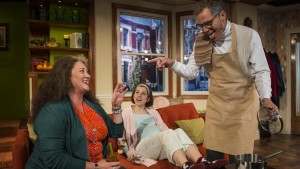
With the holiday season in full swing, it’s the time of year for dysfunctional family dramas. A Red Orchid Theatre has already sold out its production of Pilgrim’s Progress, a new work by ensemble member Brett Neveu, although tickets may still be possible to snag for the dedicated. The play stars company founding father and crowd favorite Michael Shannon, and with its innumerable references to other modern plays, is likely to flatter theatregoers’ sense of savviness. But in his eagerness to cross Who’s Afraid of Virginia Woolfe with Waiting for Godot, Neveu has not yet fully justified the McKee family’s self-conscious acting out.
The play opens with Jim McKee (Shannon), a curmudgeon, pushing his cranberry sauce on his wife, Melissa (Kirsten Fitzgerald) and pregnant teenage daughter, Rania (Charlotte Mae Ellison) while they wait for the son, Desmond (Ryan Bourque) to return from college so they can set off for Thanksgiving dinner. Their host, a man named Anderson, is a friend of Jim’s going all the way back to their theatrical performances in college, and the family has a contract to spend every Thanksgiving with him. The family has a lot of contracts, in fact; at present, Jim is negotiating one with Rania which will stipulate the number of other people she is required to discuss her pregnancy with. Jim is now a professor in a college theatre department, and firmly believes that acting techniques provide all the tools for understanding and enjoying social interactions. He demonstrates his belief by constantly quoting from the works of Sam Sheppard, David Mamet, and Tracy Letts, among others, and throwing histrionic tantrums whenever he believes doing so will make things more interesting. Melissa, a psychologist, claims to disagree, and counters with an arsenal of quotations from her own field, and sharing sensitive anecdotes about patients she insists on naming.
Rania mostly stays silent during her parents’ grandstanding, except for the occasional contemptuous remark. Jim says she has developed a phobia of blood because she was injured when fundamentalists bombed the abortion clinic she was visiting, which also prompted her decision to carry the pregnancy to term. It’s not an unbelievable backstory, but there’s something a little off about the way Jim tells it, and how he insists that Rania repeat the story at the dinner. When Desmond finally arrives, full of transcendentalist poetry relating to his chosen major, soil science, he is adamant that Rania still get an abortion, but everyone else refuses, saying it’s her choice. Desmond is becoming resentful of the family’s heavy use of contracts to govern their behavior, and of the ridiculous stories his parents make him sit through. Before intermission, Melissa relates in gruesome detail how she once attended a performance of The Glass Menagerie, which Jim and Anderson were in, during which the actress playing Amanda’s throat exploded. At this point it becomes clear, if it wasn’t already, that there are a lot of games being played here, and after intermission, we get to hear what kind of show the family put on at Anderson’s dinner.
There are some moments of effective comedy. I especially enjoyed the visual of the steam from the cranberry sauce fogging up Michael Shannon’s glasses. All the performances are terrific; Shannon is not only fully committed to his mania, but responsive to the minutest subtleties of his scene partners, and somehow makes a caricature not fully believable, but acceptable and amusing. As loud and cantankerous as he is, Fitzgerald is just as arrogant, but in a deadpan manner lacking in affectation. Ellison is a mixture of bitterness and vulnerability, who appears to be passively enduring her parent’s games, while Bourque matches them in pretentiousness, with occasional flashes of disbelief and moral disgust. It’s impossible not to think that this is how Albee’s George and Martha would be if they had children to indoctrinate, but for one thing: motivation.
In a way, asking why the family concocts their stories is a bit like asking why Vladimir and Estragon wait for Godot. It’s what they do to pass the time. But instead of a stage-like void, set designer Chelsea Warren and props designer Jenny Pinson decorate the family home with all the trappings of middle-class cosmopolitan comfort, including an African mask and a coffee table book about lingerie. It’s bizarre to see people act unrealistically in a realistic setting, and though the style of the play and its humor are easy to accept, without either Beckett’s pointed focus on existentialism or Albee’s dedication to character development, seeing the same shtick for two hours gets tiresome. I started wondering early on whether the family’s bs was going to lead anywhere, and by the end, their own imaginative abilities were failing them.
As a theatre academic, Jim is apparently immersed in performance studies, which is why he doesn’t regard Melissa’s complaint about the real-world applicability of theatrical theory as worth a response. As a psychologist, she may be similarly convinced of some kind of performative aspect underlying all behavior. But why would they end up do dedicated to their twisted improv, and of what significance is this form of lunacy? Shade Murray’s direction brings out some hilarious performances, and several of the stories are interesting in themselves. But demonstrating how terrible a family that deliberately modeled themselves on dramatic fiction would be seems like a refutation of a proposal nobody made.
Reviewed November 9, 2015
This show has been Jeff recommended.
To see what others are saying, visit www.theatreinchicago.com, go to Review Round-Up and click at “Pilgrim’s Progress”
Playing at A Red Orchid Theatre, 1531 N Wells Ave, Chicago. Tickets are $30-35; to order, call 312-943-8722 or visit aredorchidtheatre.org. Performances are Thursdays at 8:00 pm (except November 26), Fridays at 4:00 pm (November 13 and 27 only) and 8:00 pm, Saturdays at 4:00 pm and 8:00 pm (except November 14), and Sundays at 3:00 pm and 7:00 pm (November 29 only) through December 13. Running time is two hours with one intermission.








More Stories
“Hitt Records” Reviewed by Julia W. Rath
“The Berlin Diaries” reviewed by Julia W. Rath
“Legally Blonde: The Musical”